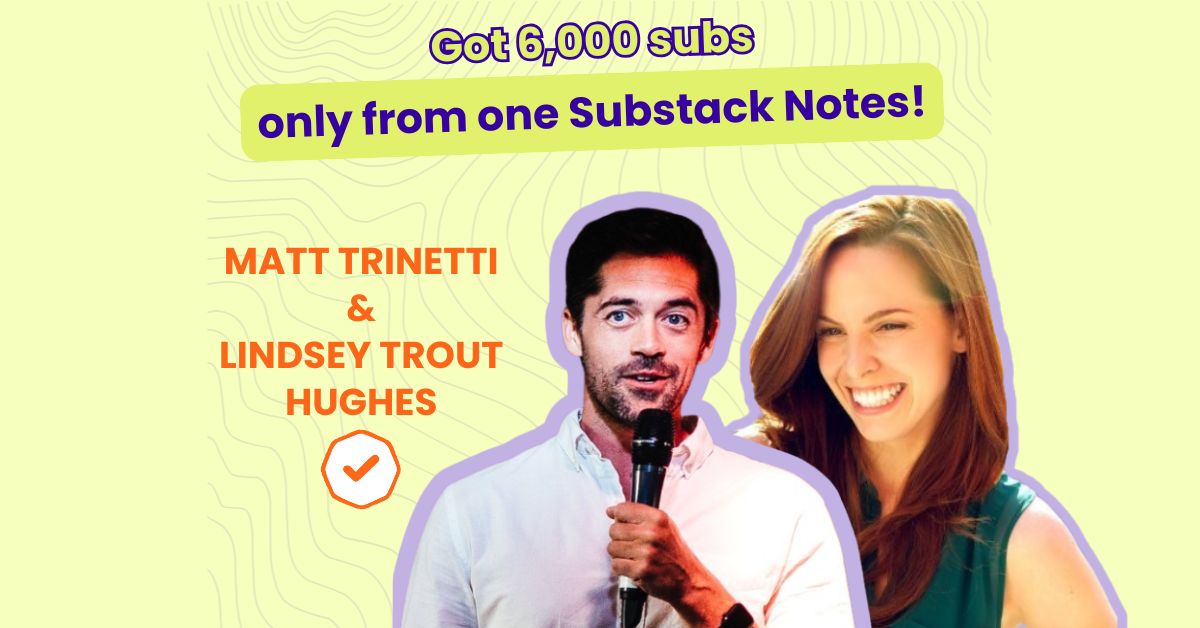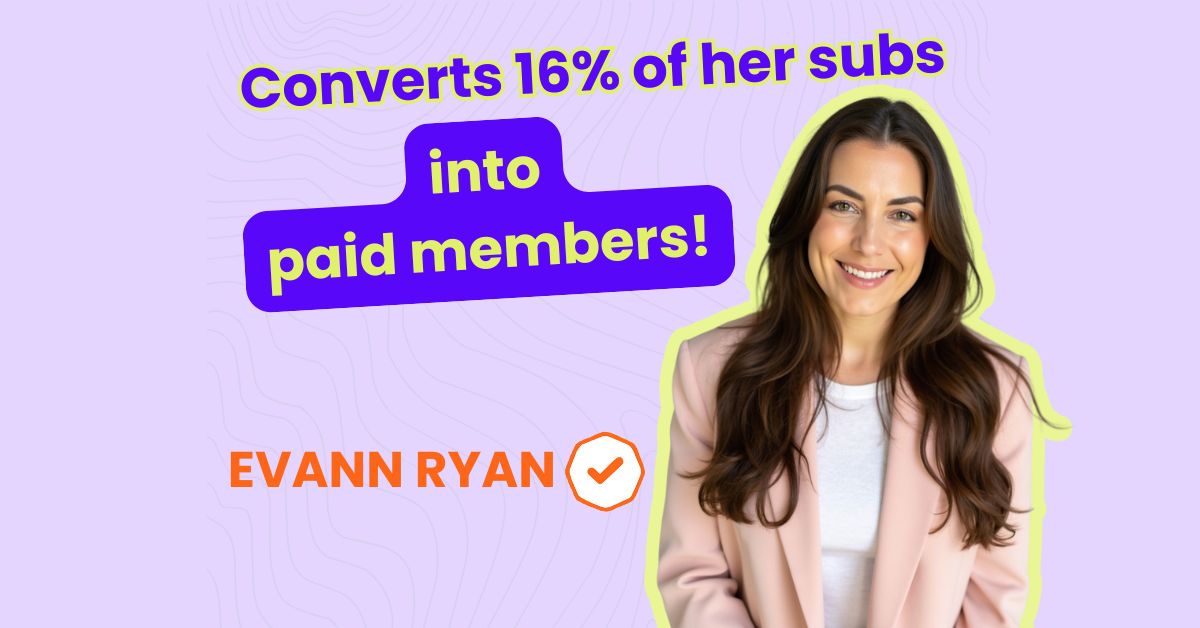Interview Date: November 10, 2024
Table of Content
- Meet Chris Cerra
- Newsletter Identity Card
- Tool stack
- How he started his newsletter
- Most effective growth strategies he currently uses
- How he generates revenue from his newsletter
- Personal & professional impact of running a newsletter
- Biggest advice to newsletter creators
MEET THE CREATOR
Chris Cerra has been a digital nomad since 2018, traveling and working full-time. This lifestyle became a catalyst for his entry into the newsletter world.
While he was traveling as a nomad, he struggled to find updated lists of long-stay Airbnb deals. So, he decided to create a newsletter, called RemoteBase, for other digital nomads to fill this gap.
Since 2019, he has been curating Airbnb deals and has over 5,000 subscribers, though the topic is niche. Moreover, his newsletter is his full-time job.
In this interview, Chris shared valuable insights on:
- how he reached over 5,000 subscribers with a very niche topic
- detailed growth strategies he used with milestones
- his sponsorship strategies
- his learnings on paid subscription
- his half-automated content curation system

NEWSLETTER IDENTITY CARD
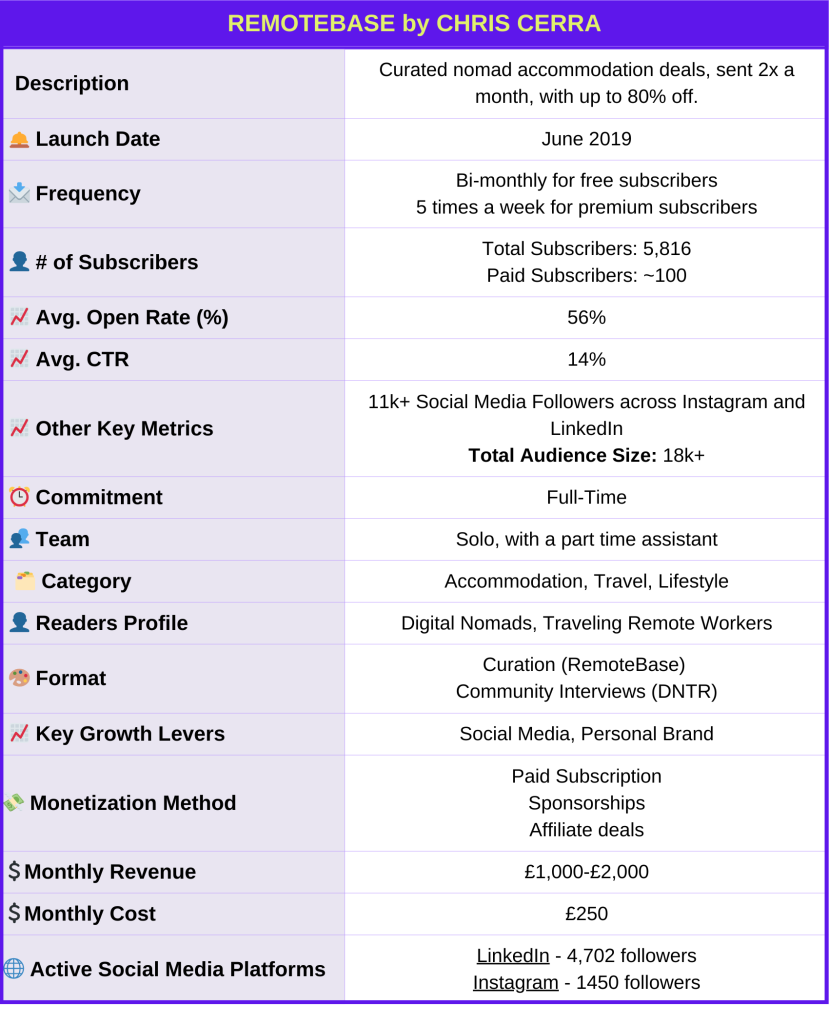
TOOL STACK
- ESP: Beehiiv*
- Writing: Beehiiv Drafts*, Google Sheets, Google Docs
- Task Management: Trello
- Growth: LinkedIn, Instagram
- Social Media Tools: Canva, Shield Analytics for Linkedin
- Affiliate: Impact, Awin, various direct platforms
- Payments: Stripe
- Sponsorships: Google Forms
START
How and why did you start RemoteBase in the first place?
The RemoteBase Newsletter started as a solution to my problem. Back in 2018, I started traveling full-time while working remotely.
I was leveraging flight hacking services like Jack’s Flight Club, Scott’s Cheap Flights (now Going), Dollar Flight Club, etc. and I was looking for something similar but for long-stay Airbnb deals, and it just didn’t exist.
I chose a newsletter as a format for a couple of reasons:
1) I’d seen firsthand how the business model works from the flight hacking services.
2) This was around the same time as newsletters like The Hustle and Morning Brew were blowing up… I loved their content, and 5 years prior, I’d finished a marketing and advertising degree.
I was super curious and always trying to dissect ‘the business of newsletters’ and predict their next moves, trying to reverse the numbers – that kind of thing.
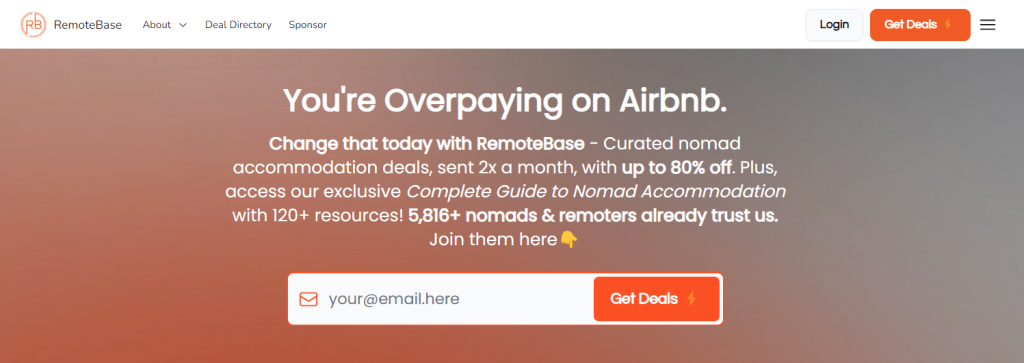
GROWTH
How did you gain your first 1,000 subscribers?
At the time, I was in a bunch of Slack groups and online forums for remote workers (this was pre-pandemic, so it was slightly more niche than in today’s world). All together, there was an audience of maybe 5k.
A fraction of those would be traveling remote workers (most would be ‘static’), but with nowhere else to go to validate the idea, I just asked in these groups if people would be interested in something like this.
I introduced it as something ‘like Scott’s cheap flights but for Airbnb’. A bunch of people put their hands up and made some noise about the idea, so I thought what the hell…1 domain name and a landing page later, and I went back to these slack groups and forums with a (very sloppy) ‘launch’.
There were 112 sign-ups in the first few hours – and I was riding high!
This was in 2019 and it was just a side project alongside a full-time job. So I wasn’t as focused on it as a business as I could or should have been.
The road from 112-1,000 was long and slow.
Some bloggers picked it up, which helped organic growth, which was helped with WoM. I tried socials, but it felt like I was putting out content on IG and it was just going into the ether!
I always told myself it didn’t matter because it was a side project, but as we crept into 700, 800, and more, and as I was watching the big dogs (Hustle/Morning Brew, etc) just rocket, I got antsier about wanting to business-ify the newsletter.
That made 900-1,000 almost painful.
I launched the newsletter in July 2019, and achieved 1,000 by October 2021 – so 27 months… 18 months, if you consider, I paused for about 9 months because it didn’t sit right with me to be promoting travel at the height of a global pandemic.
In summary, growth to 1,000 was slow and inconsistent – but it was entirely organic, and that equated to unparalleled subscriber quality.
Something interesting happened at 971 subscribers.
A boutique hotel reached out to me about promotion…I had an advertising degree, but zero practical experience in media sales, but we agreed on a sponsorship!
I made $65 with less than 1k subs and learned a lot through that whole interaction, which set the stage for my plans and intentions longer term.
What are the most effective strategies you use to grow your newsletter audience?
This evolved as different audience milestones were reached…
0 – 500 Subscribers
It was just through posting in online forums and Slack groups where I’d already built some social trust capital with the members and crucially the admins! Paired with some word of mouth, and telling people in co-working spaces I was visiting around the world.
500 – 2,000 Subscribers
It was mostly fueled by bloggers and other ‘borrowed’ SEO. At the time, I was naive about what a guest post was, so I was just reaching out and making connections with bloggers I admired, whose content I consumed, and was cheekily asking if they liked this newsletter I wrote and if they’d share it, or add it to their site as a resource for their readers.
This works when you’re small. They know what it’s like to try and get something off the ground, so most of them want to help you get out of the gate,…but when you have thousands of subscribers, this strategy becomes less successful.
2,000 Subscribers – Today
From 2,000 up, there was a focus on social media… First on Instagram, and then I found success on Linkedin (not a place I was expecting to connect with nomads, but tons is hanging out there).
In both of these places (Linkedin and Instagram), I made efforts to build a personal brand, connecting with both potential subscribers and potential sponsors.
That’s helped me a great deal with nurturing sponsorship opportunities – prospects can see that I’m not just there to sell a quick placement and move on, I really live the brand and what the brand is all about.
I didn’t start with paid acquisition until about 4,500, but I wish I’d done it sooner (around 3,000 on reflection).
MONETIZATION
What is the primary monetization channel of your newsletter?
Right now, it’s sponsorship. But getting consistent sponsors was like walking through hot fudge until around the 5k subs.
Getting sponsors before that was possible, but the kind of sponsor you get is very different.
For example, it’s just not worth it for high-caliber, big-budget sponsors to get involved in negotiations on a placement that’s $300 or less.
There’s not a magic line crossed at 5k subs that changes that. But I’ve taken a different approach to sponsorships.
Side note here: I actually operate a 2nd publication – Digital Nomad Trip Reports (DNTR).
This is more of an interview-esque type of publication (the format was inspired by nocsdegree.com), and the idea is it’s totally community lead – so we use an Airtable form to collect responses, which then get formatted into a weekly newsletter (it takes about 1 hour a week to operate).
DNTR launched in Jan 2024 – I actually acquired a list with a similar readership where the operator was closing down – it was an engaged audience but not monetized, and they wanted to focus elsewhere.
So it started with ~750 engaged subscribers and slowly grew through Beehiiv recommendations from RemoteBase to 1.2k in 9ish months.
Anyway, the strategy has been to bundle different placement types together (across RemoteBase and DNTR) and sell them in monthly, quarterly, and 6-month packages.
This strategy has made it easier to sell to companies with a more mature understanding of how newsletter placements fit into a wider strategy (and often have bigger budgets).
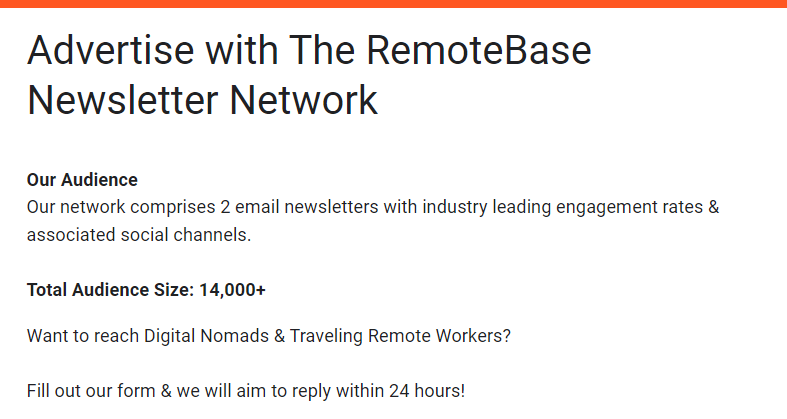
You applied paid subscription to your newsletter 3 years after the launch (see here). How did you decide it was the right time to start a paid subscription?
So, when I went all in on newsletters -and quit my job- the paid subscription was still just an idea.
I quickly launched it, and it brought some decent early revenue. But if I was doing it again, I’d have focussed more on growth (for ad revenue) and planned the premium launch more effectively.
Now, the newsletter runs on Beehiiv, but back then, it ran on Mailchimp, and I ran Stripe independently with tools like Zapier to hook things up.
Premium subscribers were offered all kinds of preference settings, and everything was hooked up to work, but it was quite a scrappy and high-effort set-up. That’s evolved since both the processes and setup, as well as the actual offering.
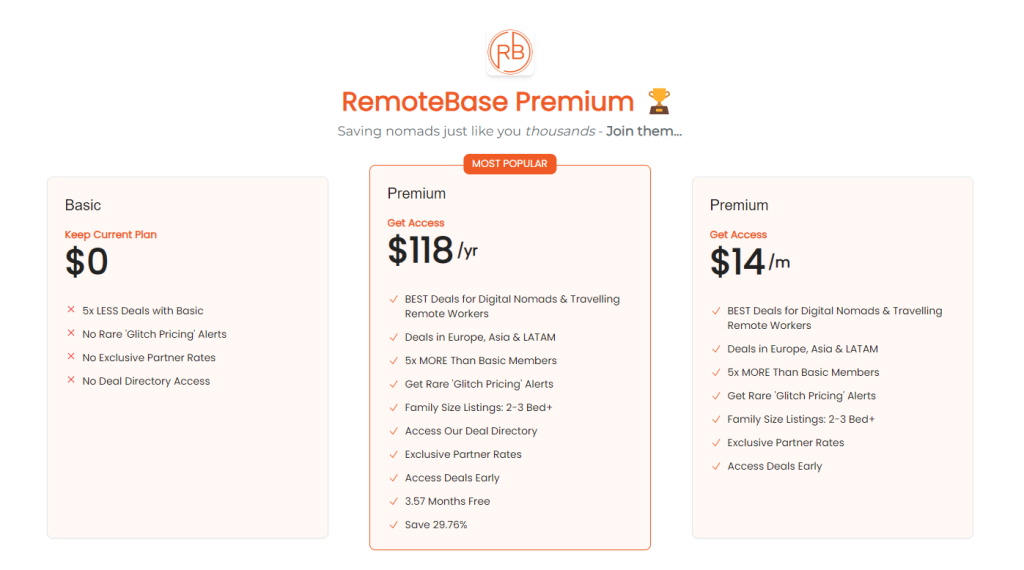
How many paid subscribers do you have currently? What are your key strategies to increase that number?
The audience is just over 6k, and today, there are less than 100 paid members, so we’re floating above the 1% mark. It’s not a conversion rate I’m proud of, and there’s actually been more churn than usual in the past 6 months.
I find my energy and focus are like a pendulum that swings from subscriber growth and selling ad space to nurturing subs and converting readers to paid members.
The past 6 months have been heavily focused on growth and advertising revenue.
When the pendulum swings back and the focus becomes converting more users to be paid, it’ll probably be part of a wider shift: re-evaluating the welcome sequence and introducing or adjusting drip campaigns triggered by any clicks on the premium links that don’t convert, etc.
One strategy I’m sure I’ll explore in the future (but not in this next phase, is targeting existing (free) subscribers to upgrade using paid social ads.
There is an existing referral scheme in place – with a digital download for 1 referral, and a second ‘prize’ is coming soon for 3 referrals.
I’ve also talked to brands about running referral giveaways, and the appetite is there, so the first of those will come before the end of this year, with the intention to fuel the top of the funnel for more paid subs.
Even though there’s currently only 1 ‘prize’ for 1 referral, the highest referral rate is 9 referrals. I’d really like to leverage this willingness to refer and try to incentivize it in the best way possible.
What are your biggest learnings when applying for a successful paid subscription?
Whenever I talk to other newsletter operators about running a paid subscription, I always tell them to consider the additional time.
For the content we produce, it’s pretty time-intensive, and with our recent churn, we’re at the limit of profitability.
“If your paid stuff is not too time-heavy, you’ve obviously got a lot more room to play with, but it’s worth running the numbers before you launch paid.”
CONTENT CREATION
You mentioned in your FAQ page that your content curation system is half automated and half manual (see here). What does your automation process look like?
RemoteBase content curation is half automated through the use of web scraping chrome extensions, and then quality controlled and formatted for the newsletter.
The content is a little different than the ‘typical’ newsletter, in the sense that most newsletter content has a healthy lifespan, or is evergreen, whereas RemoteBase content is ephemeral – If there is an amazing deal on an Airbnb listing in Madrid, and the check-in date is October 10th. Since October 11, that content has been dead, so our curation pipeline is just constantly going!
I love newsletters and the business of newsletters, but for this reason, I sometimes think RemoteBase was the hardest publication to ‘cut my teeth’ on.
IMPACT & LEARNINGS
How did building RemoteBase newsletter contribute to your life professionally and personally?
It changed everything for me. Professionally and personally. Slowly at first, and then very quickly.
Professionally…
Anyone who has made money on the internet will know that feeling when the first dollar, euro, pound, whatever, lands.
The moment that email notification comes in.
It just differs from any other money you make.
And for me, that came from RemoteBase.
Plus, even though I studied and had early roles in marketing, my career went down a very specific path, and the job I had before choosing to quit for full-time newsletter life was very far from marketing.
So this shift to the newsletter felt like ‘coming home’ in the sense that I was coming back to marketing, media, and this whole space.
Personally… Given how linked the content is to the nomad lifestyle, which was so transformative for me it’s safe to say the personal impact has been huge.
The newsletter drove me to focus on building my personal brand alongside the newsletter, which has involved being an active voice in the community of digital nomads and a proponent of remote work.
Downstream, that’s meant media coverage, invites to speak at events, and even being recognized in places like co-working spaces in nomad hotspots.
All that is completely wild to me, and I have to constantly remember how powerful and awesome it is to be able to hit a button and send a message to thousands of people!
What would you do differently if you had a chance to start over RemoteBase?
Wait longer to launch the paid newsletter, and start running IG and FB ads sooner.
What would it be if you had the right to give one piece of advice to aspiring newsletter creators?
Don’t wait. There will never be the ‘perfect’ moment; you just have to start, publish, and iterate. Publish, learn, publish, learn.
And network in the space – it’s crazy how many other newsletter operators I follow and DM and learn from.
Final Words
I’m always looking to connect with other newsletter operators, so if people want to reach out or connect on socials! I’d be especially interested in connecting with any local newsletter operators as I’m currently planning a launch for that recently!
Where to find Chris Cerra
*indicates affiliate links

